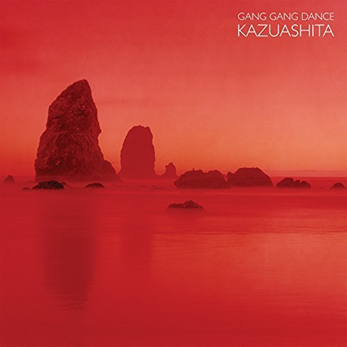We’re here to tell you what’s hot and what’s not in this week’s music roundup
This article previously appeared on Crossfader

Christina Aguilera – LIBERATION
Genre: Pop
Favorite Tracks: “Sick of Sittin’,” “Accelerate,” “Masochist,” “Pipe”Listen—there are many, many worse pop records out there than LIBERATION, but I’m not going to pretend like Xtina is due for a massive career renaissance all of a sudden. And that’s fine. She’ll be fine. I will also cop to this—a couple of songs on LIBERATION are BANGERS. There are a lot of head-turning producers on this album, some expected (Pharrell), and some maybe not so much (Kanye, Anderson .Paak), and this record kind of lives and dies by who’s behind the board for each song. The winner on this album, and the one that comes closest to truly reviving the raw power of the Christina Aguilera of 20 years ago, is .Paak’s “Sick of Sittin,” with a beat that’s a synthesis of The Roots and Jack White’s solo albums and the most genuinely energetic performance from Aguilera on the whole project. A couple of other tracks worthy of your attention: “Accelerate,” a Kanye-produced track, is a lot of fun, aided greatly by Aguilera’s willingness to be game for a vaguely DARK TWISTED FANTASY-style synth-rap fantasia, and a guest appearance from the consistently excellent 2 Chainz. Also, “Pipe,” Aguilera’s somewhat SZA-ish take on a modern torch song, works a lot better than I would have thought; there was never any doubt that she has the voice for this kind of track, and it doesn’t hold up with more recently successful iterations of this type of song, but it’s undeniably intimate and well-done, especially on the production end.
But there’s something kind of LEMONADE-ish about this album, though, and not in a good way. LIBERATION doesn’t cross over into blatant trend-chasing as much as it could, but even when it does, it’s surprising how at home Xtina feels, even if it’s undeniably uncomfortable when the song that is, by far, the best on the record is so transparently indebted to another artist’s work. “Maria,” the first fully realized song on the record, just . . . doesn’t make sense. Aided by a sample of a young Michael Jackson, this is Christina’s attempt at an “alter ego” track where Maria is her younger, pre-fame self. It’s neither her nor Kanye’s best work, and feels like a total dead end thematically with the rest of the record. Meanwhile, the single “Fall in Line,” a duet with Demi Lovato, sticks so clearly to the “female empowerment song” script that it comes across as insincere.
But all things considered, Christina’s vocals are impressive as ever, and she proves fairly chameleonic on a record that is a clear attempt to rebrand her for younger listeners. LIBERATION isn’t likely going to be good enough to get her back on the charts, but you gotta give it up for a talent like hers. [Adam Cash]
Verdict: Recommend

Calpurnia – SCOUT EP
Genre: Indie Rock
Favorite Tracks: “Greyhound,” “City Boy”
I’ll say this: Finn Wolfhard’s earnest love for indie rock makes Calpurnia’s debut EP competent. At only 15, the actor best known for his role on Netflix’s STRANGER THINGS has quickly made his obsessions with music and indie rock known, from his friendship and work with Toronto punkers PUP to his vocal support for buzzy indie rockers like Courtney Barnett, The Lemon Twigs, Foxygen, and Kurt Vile. Those artists are kind of transparently informing SCOUT, an EP that’s enjoyable enough, even if rides high on a baby’s-first-album kind of cuteness while lacking any of its inspirations’ personality. The band feel like they’re going through the motions with SCOUT without ever actually having put those motions into practice, achieving a kind of blind enthusiasm across all six tracks. The first four songs center around Wolfhard’s deadpanned howls and drawls—it’s a nice building block around which Calpurnia should focus on in the future, at times achieving a kind of pre-adolescent Lou Reed impression. With twinges of surf rock and punchy indie pop, the group lays out some catchy tunes, notably “Greyhound,” a well-mixed, five-minute rocker that owes a fair amount to Wolfhard’s idols, Twin Peaks. “Greyhound” subdues a lot of the musical bloat that comes with some of the ideas on SCOUT, restraining the organs and vocal oooh’s and ahhh’s to a nice swirly finale. The final two tracks begin to diverge from the group’s more cut-and-dry indie rock strengths, with shoehorned trumpets or jazzy guitar interludes on “Blame,” or the muddled layering of Ayla Tesler-Mabe’s vocals on closing waltz “Waves.” Even though this isn’t likely what Calpurnia was going for, SCOUT works more as a precursor to whatever comes next than it does a truly lived-in EP, a fine-enough indie rock palate cleanser but a clear work in progress by a band of high schoolers whose influences, instincts, and actual playing abilities are still manifesting. It’s clear Calpurnia is not a vanity project, but even though it’s a pleasant enough listen, this EP doesn’t quite hit the mark yet. [CJ Simonson]
Verdict: Do Not Recommend

Dawes – PASSWORDS
Genre: Indie Rock
Favorite Tracks: “Crack the Case,” “Telescope,” “I Can’t Love,”
Welp, it looks like the horrible electronic wonkiness of WE”RE ALL GONNA DIE was not a one-night fling, and although PASSWORDS is an improvement, the same incongruence between Dawes’ simple charm and their increasingly bloated music persists. Much like Frank Turner’s latest, PASSWORDS urges peace and understanding at a time when such pleas are increasingly out-of-touch. Dawes is lucky that Taylor Goldsmith can sell these pleas with a quaintly endearing optimism; he brings together the album’s disparate musings on politics and love with vulnerable confessions like,“It may not make it any better, I’m just hopin’ that it might” and, “I never knew how to be scared / ‘Til I found somethin’ I knew I couldn’t lose.” However, from the opening stoner-rock riff of “Living in the Future” that transitions into a heavenly chorus, the music has no idea what it’s doing. While the production is looser and more fitting than WE’RE ALL GONNA DIE’s sharpness, there are still too many odd sonic layers that stretch out songs to unreasonable lengths. Many of the bridges suffer from new, warbling textures that don’t add to a greater crescendo or keep things fresh, but feel tacked on and only detract from the otherwise tender ambience. Dawes is at their best when the arrangements are simpler and driven by gentle pianos or acoustic strumming; there’s no need for the Cure-esque, Arabian flair of “Feed the Fire,” or the inexplicable gurgles of synth against the orchestral hits on “My Greatest Invention.” When the album finds the right sonic accompaniment for Goldsmith’s bleeding-heart lyrics, the result is spellbindingly romantic; I just wish Dawes knew when enough is enough. [Blake Michelle]
Verdict: Do Not Recommend

Gang Gang Dance – KAZUASHITA
Genre: Neo-Psychedelia, Indietronica
Favorite Tracks: “J-TREE,” “Lotus,” “Kazuashita,” “Young Boy (Marika in America),” “Snake Dub,” “Too Much Too Soon”
A seven-year hiatus is usually exactly what it takes for a band to start releasing albums that play like hot garbage, but for Brooklyn legends Gang Gang Dance, their return to the spotlight surprisingly finds them in peak form. Their early material was impressively (and often aggressively) experimental, indebted equally to world music innovators like Gabor Szabo and electronic freak folk pioneers such as Black Dice and Animal Collective. On KAZUASHITA (which translates roughly in Japanese to “peace tomorrow”), the group’s three members grapple with New York City life in a crumbling country, while also dialing in their sound and yielding themselves mainstream potential for the first time in their career. “J-TREE” opens with a skittering drum machine and a guitar sample that ironically sounds like it could have been played by U2’s The Edge. What is most surprising and impressive about this track, however, is that singer Lizzi Bougatsos is using her Meredith Monk-esque falsetto to sing more like Björk than Deerhoof’s Satomi Matsuzaki. While the scream-style vocals on Gang Gang Dance’s unrestrained early work certainly possessed a high caliber of Bushwick cool, it also guaranteed that the band’s releases would be heard by only the most pretentious blog-centric music nerds. The listenability continues on the album’s lead single “Lotus,” which sounds like Little Dragon made a record on Mars. There is a retro-futuristic ‘80s takeoff to the song’s chorus that leads me to suspect that John Maus may have had some say in the making of the record. The latter half of the album is more akin to the trio’s earlier work. Title track “Kazuashita” sounds like a grown-up version of the group’s legendary, sprawling, avant garde-to-the-max track “Mindkilla.” Two minutes of crystalline synthesizers and a low voice naming vibrant colors give way to a five-minute jam that somehow manages to sound like chillwave, Middle Eastern music, and Pat Metheny were thrown into a blender and turned into a fascinating sonic concoction. “Young Boy (Marika in America)” and “Snake Dub” both sound like Purity Ring decided to record their debut album SHRINES in a psychedelic hostel in the Middle East instead of a more conventional setting. As a whole, KAZUASHITA finds Gang Gang Dance doing what they do best: deconstructing listeners’ previously conceived musical notions. However, it seems that in the more than half-a-decade they took off from being a recording act, the band grew up and learned to reconstruct the musical barriers they destroy, all the while remaining steadfastly eclectic. KAZUASHITA is a shocking and beautiful psychedelic trance of an album, and is by far the most rewarding experimental music I have heard in a long time. [Ted Davis]
Verdict: Recommend

M. Ward – WHAT A WONDERFUL INDUSTRY
Genre: Indie Pop, Indie Rock
Favorite Tracks: “Miracle Man,” “El Rancho,” “Bobby”
Well, color me surprised! Best known in 2008 – 2010 for his prominent roles in She & Him and Monsters of Folk, both two of the most talked-about groups of the time, it’s staggering to learn that M. Ward’s been in the business for almost 20 years, continuing to steadily chug along and weathering out the waning of the sunny, folk-flecked indie that dominated the blogosphere of yesteryear. The long and short of it is that I never really paid M. Ward much mind, assuming, perhaps not incorrectly, that I could turn to Bright Eyes or Fleet Foxes to get what I’d be getting from him, and better to boot. As such, WHAT A WONDERFUL INDUSTRY is the first M. Ward joint I’ve tried on for size since high school, and you know what, it ain’t half bad! I’m currently on a personal deep-dive into the ‘60s, which certainly boosts my appreciation for the soft, retro-fitted vocals, progressions of acoustic plucking, and easily accessible arrangements that he typically favors, but there’s a simultaneous undercurrent of toothsome grit here that hasn’t been easily ascertained in other releases from Ward’s catalog, best demonstrated on tracks such as “Sit Around the House” and “Bobby.” A loose conceptual album involving M. Ward’s various experiences in the industry, it’s clear that there’s a desire to both kick ass, take names, and indulge in the occasional bout of navel-gazing melancholy, and brother, what else could life be about. It’s a hard album to love, as there’s still not really any new additions to the formula that made him being attempted and there’s only so many white men with guitars we can signal boost in 2018—plus, “A Mind is the Worst Thing to Waste” just kinda sucks—but it’s a perfectly pleasant outing on the same token, and bluesy barn-jammers like “Poor Tom” at least demonstrate half a willingness on behalf of the dog to learn new tricks. Why not! [Thomas Seraydarian]
Verdict: Recommend

Petal – MAGIC GONE
Genre: Alternative Rock
Favorite Tracks: “Stardust,” “Shy,” “Better Than You”
Petal, a Pennsylvania emo-adjacent indie rock project led by Kiley Lotz, is another in a wave of female-led projects that feature heart-on-sleeve lyrics, passionate delivery, and hella guitars. MAGIC GONE gets off to a pretty terrific start with “Better Than You,” which has a very nice upbeat energy to it. It sets the table for a record in the vein of a slightly more traditional approach to the kind of thing that Alvvays does very well—indie pop-rock that combines infectious melody with deft personal touches. But that’s not ultimately the kind of album that MAGIC GONE is, and it’s hard not to feel a bit disappointed by that. There’s just a few too many solo songs on this record that are performed with skill but don’t connect or differentiate themselves from one another nearly enough to succeed. Individual highlights are still abundant, though the thing that keeps this record being pretty good rather than great is its sleepy back half. Album closer “Stardust” is probably a better representation of what this record is at its best, and might have actually been considered radio-friendly 15 or so years ago, like the kind of song you’d hear on THE O.C. soundtrack but with a little twist of the Pavement/Pixies-era ‘90s rock that is a reference for a lot of modern indie groups. Many of these songs are, at least, very solid on their own, and that’s a good sign. “Shy” is a great bit of songwriting, but there is a lack of momentum within the framework of the record that ultimately feels disappointing and causes some good songwriting to potentially turn into background music. And, as is true with a lot of young, talented songwriters, it feels like there are still a few walls between them and the listener that need to be broken down, which is bad news when your primary approach on these songs is “stripped down.” Petal isn’t going to get the universal levels of acclaim that some of their contemporaries have pulled in the last year or so with MAGIC GONE, but they appear to have the skill to get there someday and are deserving of a light recommendation. [Adam Cash]
Verdict: Recommend

Protomartyr – CONSOLATION EP
Genre: Post-Punk, Art Rock
Favorite Tracks: “Same Face in a Different Mirror,” “You Always Win (feat. Kelley Deal)”
I am firmly on the wrong side of history, at least as reviews from my peers would suggest, but I kind of hated RELATIVES IN DESCENT, Protomartyr’s buzzworthy 2017 release that brought them back in the music world’s consciousness after 2015’s THE AGENT INTELLECT was rather quickly forgotten. Not offering enough progression on their sound to grab my attention, I found it stuffy, stiff, and the death knell for post-punk, pretentious. Thankfully, Protomartyr has kept their name in the news cycle with the compact and exciting CONSOLATION EP, which features a heavy assist from Kelley Deal of The Breeders and Mike Montgomery of R. Ring. I suppose the most immediately notable element of CONSOLATION is how much warmer it feels than their past releases, with the “angular” descriptor that haunts so many genre write-ups nowhere in sight, except perhaps a brief recapitulation of past tricks on “Wheel of Fortune.” But for the most part, the guitars are welcoming and wide-armed and Joe Casey either turns down his posh snarl for something more tender (“Same Face in a Different Mirror”) or doubles down with help from Deal to round out and deliver choruses inching ever closer to “stadium” consideration. You’re still best off if you’re already oriented within the world of Iceage or The Drones, but tracks such as the closer surprise and delight in all their orchestral, Pixies-referencing, drunken-ballad-mumbling glory. It’s too short to be considered as much more than a pleasant palate cleanser, but if Protomartyr continue in this vein it seems clear they still have plenty of tricks up their sleeves. [Thomas Seraydarian]
Verdict: Recommend

Rico Nasty – NASTY
Genre: Hardcore Hip Hop
Favorite Tracks: “Countin’ Up,” “In The Air,” “Why Oh Why”
Rico Nasty may be 2018’s toughest rap star, not only because her unrestrained rap bangers go so hard, but also because of her work ethic. At 21, the Maryland rapper has dropped six mixtapes, landed a Fader cover, and signed a deal with Atlantic Records. NASTY is an unapologetic victory lap, buzzsaw synths laying the foundation for some of the cockiest bars of the year. Though she might be at the top of the game, Rico’s success story is rife with tragedy. Losing the father of her child at a young age and taking the “nasty” part of her name from a high school insult about her scent, Rico capitalizes by turning her struggles into art amidst seeking out stardom. Money-centric tracks like “Countin’ Up” and “In The Air” may not reflect the more human elements of Rico’s come-up from expelled high school outcast to major label rap sensation, but with more background about her success story, it’s easy to find yourself rooting for her instead of shaking your head at tracks that often come off as arrogant and opulent. [Ted Davis]
Verdict: Recommend















Comments